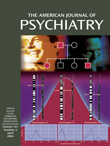To the Editor: We appreciate the comments by Drs. Shanks and Venneri that address the interpretation of results from our study. Cerebral mechanisms involved in the development and expression of delusions in Alzheimer’s disease are complex and multifactorial. In their letter, two important concepts are highlighted: 1) specific brain regions and neural processes involved in the expression of delusions are variable and depend on the content of the delusional thought, and 2) deficits in particular cognitive abilities may play an important role in the development of delusional thoughts, perhaps more important than the extent of isolated cortical dysfunction. We agree. Regional cortical hypometabolism and specific cognitive deficits are probably interdependent contributors to delusions.
In our Discussion, we noted several factors that may influence the relationship between regional brain function and delusional thoughts in Alzheimer’s disease. We also presented a hypothesis linking dysfunction in specific cortical areas to delusions with particular content or emotional valence. This hypothesis has some empiric support but needs to be rigorously tested. The models of cognitive and physiological contributions to the development of delusions that are cited by Drs. Shanks and Venneri (Ellis and Lewis, 2001, and Frith, 1999) provide a coherent view of possible intermediary processes. Studying patient groups with uniform delusional thoughts and including cognitive neuropsychological evaluations along with measures of regional brain function, as proposed by Drs. Shanks and Venneri, can help test these hypotheses and further refine etiological models.
There are some practical challenges in this approach. Groups of patients with uniform delusions tend to be small, patients often have more than one delusion, and the content can change within certain bounds over time. Moreover, a delusion’s interpersonal meaning, emotional valence, or cognitive link to personal identity can be difficult to measure but may be critical in its cognitive or physiological development. There also may be a conceptual advantage to studying patients with a variety of delusional thoughts. Regardless of thought content, memory deficits, or perceptual influences, patients with delusions are unusually willing to accept an implausible conclusion. This cognitive process that extends beyond specific thought content may itself have discrete neurobiological underpinnings.
A complementary approach may be the optimal research strategy for the near term. Studying larger groups of patients with well-characterized thought content and cognitive abilities can help clarify etiological mechanisms. We are currently studying a larger group of patients with Alzheimer’s disease with targeted neuropsychological assessments, hoping to shed more light on the factors that influence the development of delusional thoughts.
An additional critical goal is to examine the effects of neural systems rather than individual cortical loci. Discrete nodes in cortical circuits probably each contribute certain aspects to delusional thought content or its genesis, but broad systems are involved in the overall expression. Studies that examine activity in multiple cortical sites and their interactions, along with an assessment of specific content and cognition, as suggested by Drs. Shanks and Venneri, may contribute to an etiological model that elaborates brain mechanisms and can be applied to clinical care.

